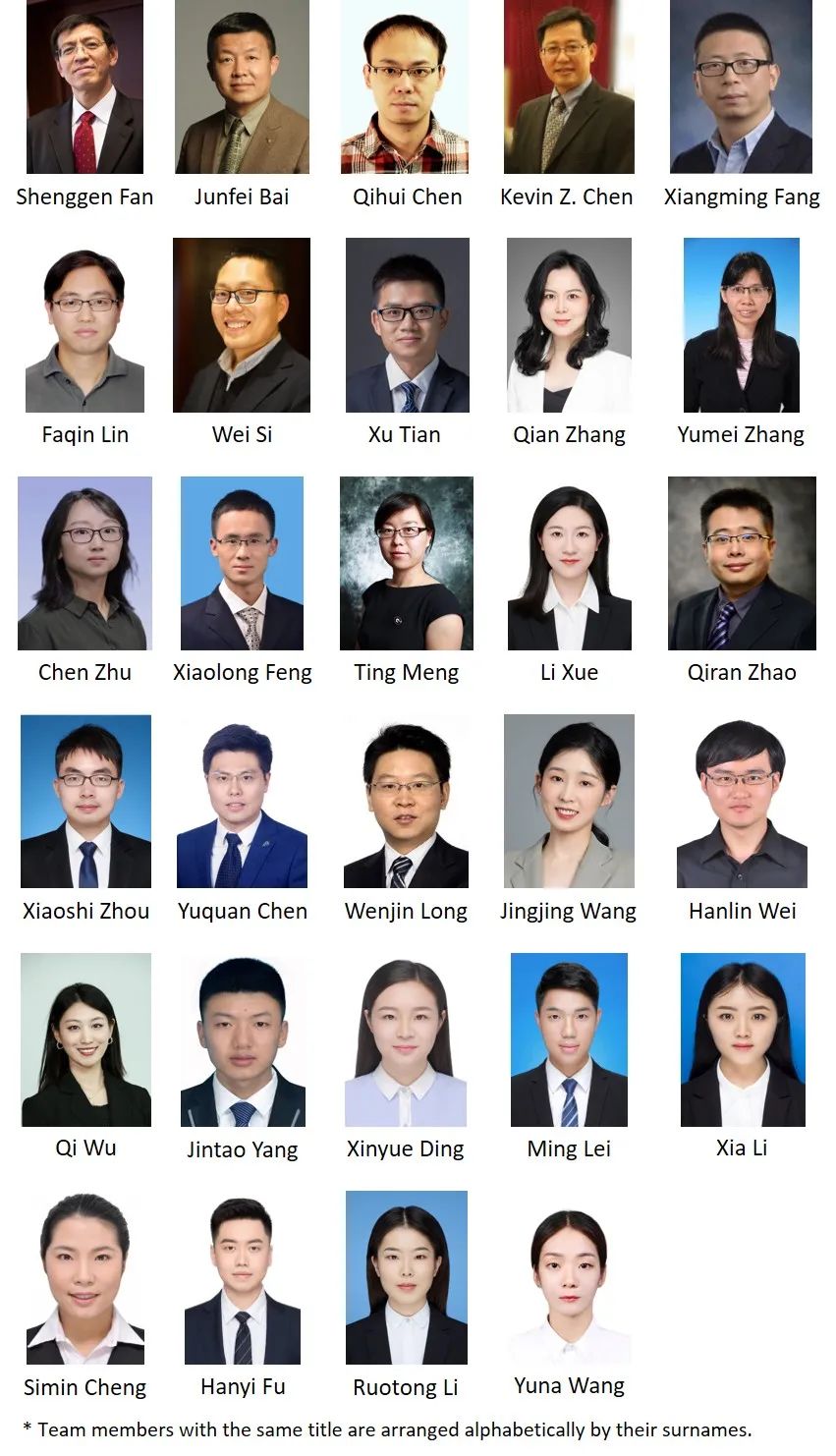
| Your current location: home page |
|
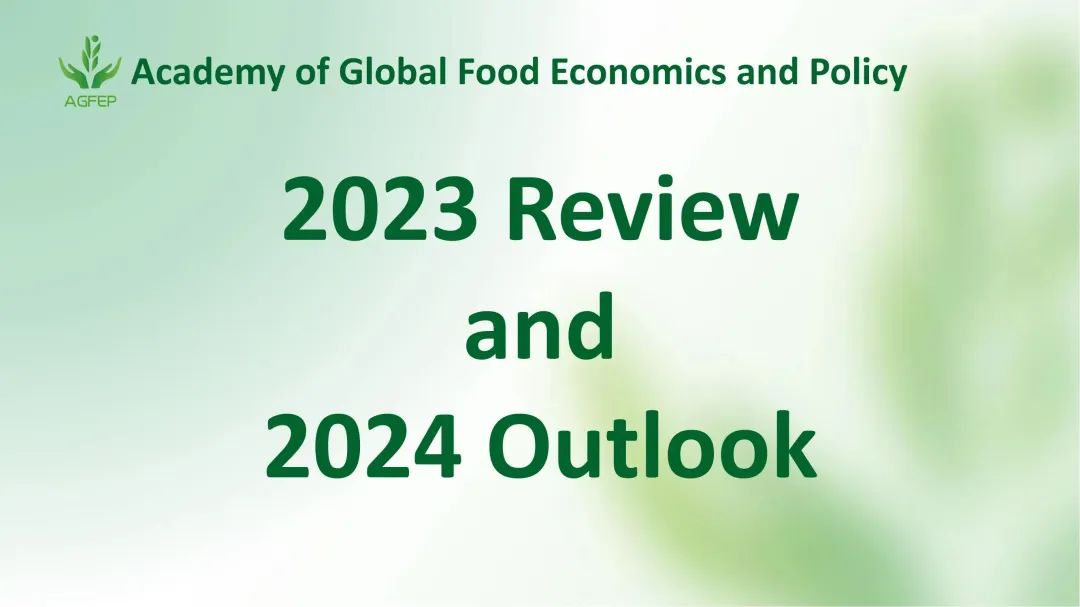
![]()
The Academy of Global Food Economics and Policy (AGFEP) is affiliated with China Agricultural University (CAU). The academy is headed by Dr. Shenggen Fan, chair professor at China Agricultural University and former Director General of the International Food Policy Research Institute (IFPRI). The academic committee of AGFEP is composed of 14 scholars from both domestic and international communities, specializing in food policy, environmental science, nutrition, and agricultural economics.
With the key strategy of "Focusing on China, with a Global Perspective," AGFEP features a close integration of the global agenda and China's practices, a multidisciplinary research approach, and a management mechanism emphasizing collaboration and talent development. The key research areas include reshaping global and Chinese food systems for improving nutrition and environmental sustainability, emergencies, risks, and crises of food and nutrition security, and the food-economy-environment-health nexus. The academy provides forward-looking and evidence-based strategic policy options for China as well as the global community.
![]()
• AGFEP released its annual flagship report: "2023 China and Global Food Policy Report" (in Chinese and English), with the theme of "Promoting Sustainable Healthy Diets for Transforming Agrifood Systems." It analyzes strategic options for achieving sustainable and healthy diets in China, which also provides important insights for other emerging economies.
• AGFEP members published numerous articles in international academic journals such as PNAS, Nature Food, Food Policy, Journal of Rural Studies, Economic and Human Biology,and World Development. Additionally, the team has also edited and launched special issues in Agribusiness and Frontiers of Agricultural Science and Engineering (FASE) on transforming food systems for improving nutrition, food security, natural resources management, and climate change mitigation.
• AGFEP collaborated with partners to host or organize international events such as the World Agrifood Innovation Conference (WAFI) and the International Forum of Low-Emission Agrifood Systems (IFLEAS), providing platforms for international cooperation and academic exchange.
• The academy continued its effort in developing its talents. The team received two awards from CAU for developing top talents in the university. Meanwhile, one postdoctoral fellow was selected for the National Postdoctoral Talent Program, while two were accepted into the 2023 National Funded Postdoctoral Research Program. Additionally, team member Dr. Xu Tian was named a national-level young talent scholar. Dr. Xiaolong Feng was selected as an Outstanding Demonstration Project Implementer in the "Double Hundred Action Plan" for 2023. Dr. Yuquan Chen won the second prize in the 3rd Beijing Higher Education Teachers' Teaching Innovation Competition.

Flagship Report: 2023 China and Global Food Policy Report (CGFPR)
In spring 2023, AGFEP released its flagship report, "2023 CGFPR: Promoting Sustainable Healthy Diets for Transforming Agrifood Systems" (in Chinese and English). The 2023 report delves into sustainable and healthy diets specifically for the Chinese population and presents strategic options for China's dietary transformation. The report provided an overview of the global and Chinese research progress on sustainable healthy diets and analyzed the dietary patterns and health impacts in China as well as in different regions. This regional differentiation is important as China is a large country with diverse cultures and traditions in its diets and significant variations in natural resource endowments. The report constructed new nutritional and healthy dietary analytical models, evaluated the environmental effects of dietary patterns by region, simulated the contribution of changing dietary choices to environmental sustainability, analyzed the impact of global food trade and investment on the diets and nutrition of Chinese residents, and explored how to use consumer interventions to achieve sustainable and healthy diets.
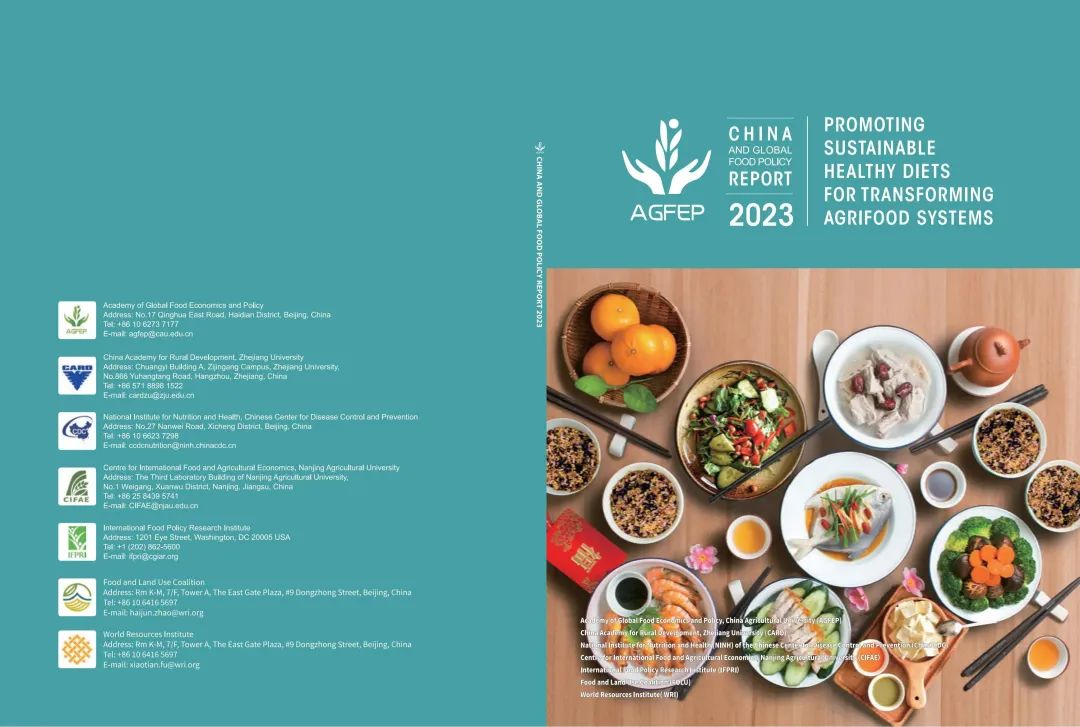

Co-hosted and co-organized the World Agrifood Innovation Conference (WAFI)
On November 2-4, the World Agrifood Innovation Conference (WAFI) was held in Beijing. Dr. Shenggen Fan, the Dean of AGFEP, served as the Vice Chair of the Conference's Advisory Committee. AGFEP hosted three parallel forums at WAFI.
The parallel forum "Future Food for Health and Environment" focused on the development of future foods, human nutrition and health, and environmental sustainability. The forum participants shared their practices, latest progress, and future plans, explored the pathways and tools to address food security and nutritional health challenges, and offered feasible solutions to promote the transformation of agrifood systems for achieving multiple goals simultaneously, including nutrition, food security, climate mitigation and protecting smallholders and vulnerable consumers.
The parallel forum "Empowering Livestock and Fish Sectors through Innovations" provided a platform for interdisciplinary exchange through keynote presentations and roundtable dialogues, delving into how technological innovation can address the challenges faced by the livestock and aquaculture industry. The participants shared their on-ground experiences and future pathways to promote efficient and low-carbon development in the sectors. Key policy measures to reduce risks and enhance resilience to support the high-quality development of the future livestock and aquaculture industry were discussed and debated.
The parallel forum "Low-carbon Agriculture and Sustainable Development" aimed to foster low-carbon transformation and multi-target coordinated development of the agrifood system. The forum had keynote speeches and roundtable discussions on development pathways and strategies for low-carbon agriculture and shared practical cases related to low-carbon transformation. The conclusions from these discussions provided evidence and recommendations for emissions reduction policies for sustainable agrifood systems.
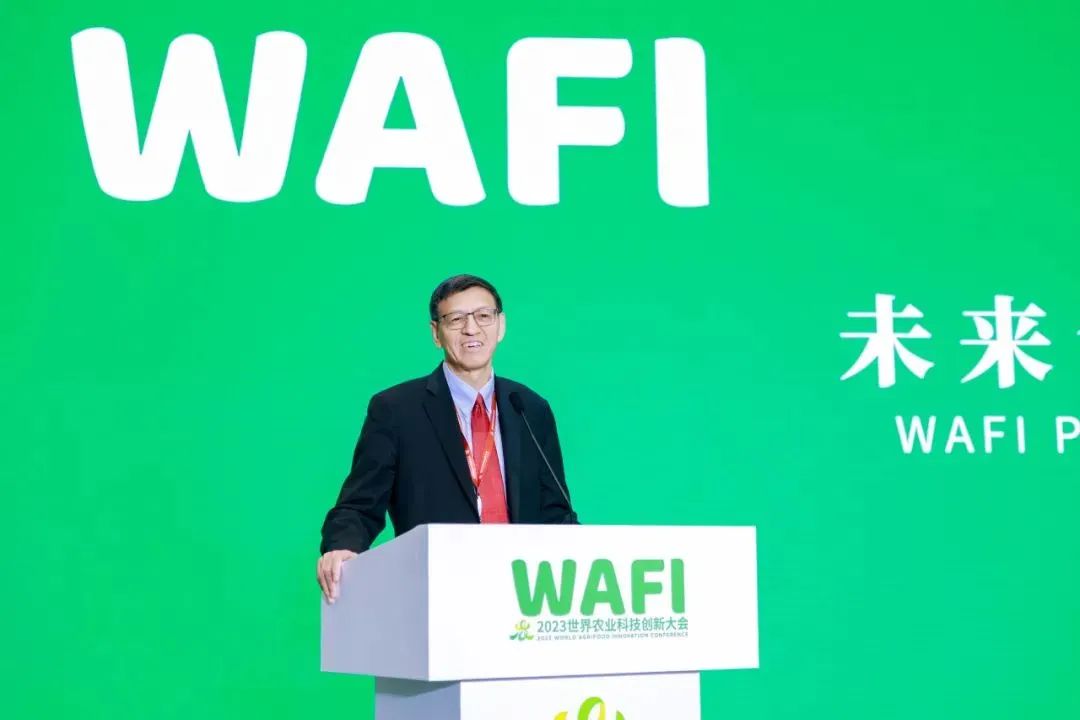
Co-initiated the International Forum of Low-Emission Agrifood Systems (IFLEAS)
On July 4th, AGFEP jointly launched the International Forum of Low-Emission Agrifood Systems. With the vision of "Transforming agrifood system for a sustainable future," the Forum aims to advance scientific research and practical actions for the low-emissions transformation of agrifood systems in China and globally. The Forum is designed to foster dialogue and exchange among academia, industry, and government in order to establish cooperation in talent development, actively address climate change, and enhance climate adaptability and resilience.
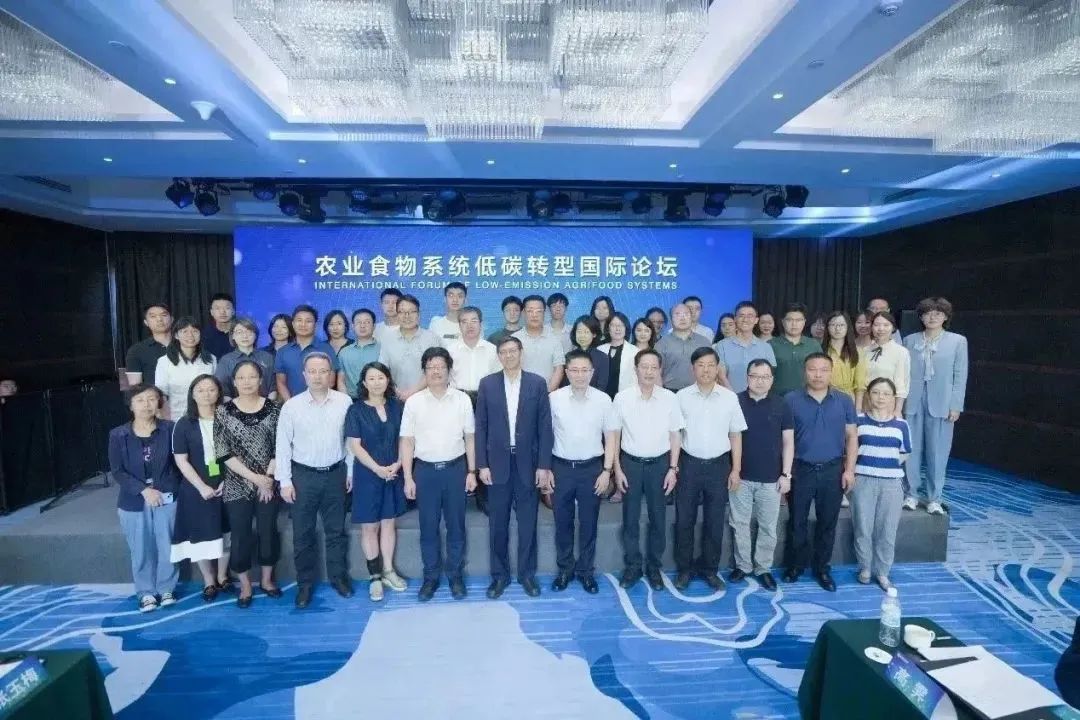
Hosted the China-Africa Food Systems Transformation Roundtable
AGFEP hosted the China-Africa Food Systems Transformation Roundtable in Addis Ababa, Ethiopia, with partners from the International Food Policy Research Institute (IFPRI), Ethiopia Strategy Support Project (ESSP), and CGIAR. The conference aimed to enhance cooperation and share experiences between China and Africa, jointly addressing global challenges such as climate change, public health emergencies, and food insecurity. The conference discussed the future direction, strategies, and paths for food systems transformation in China and Africa, providing insights for in-depth research on south-south cooperation and the development of the China-Africa Food Systems Transformation Knowledge Sharing Platform.
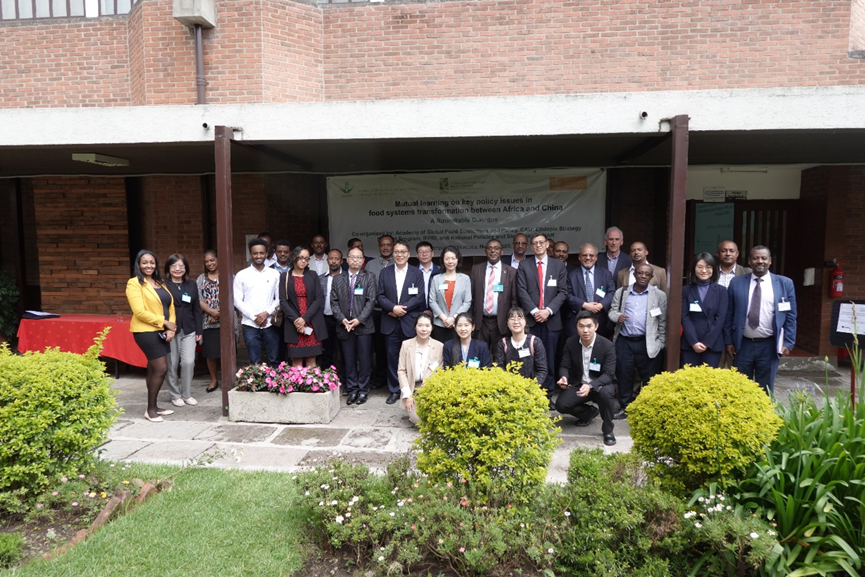
AGFEP @ COP28
Prof. Shenggen Fan, the Dean of AGFEP, participated as an expert in discussing and drafting the "United Arab Emirates Declaration on Sustainable Agriculture, Resilient Food Systems, and Climate Action." As one of the core achievements of the food systems agenda for COP28, the declaration was jointly signed by more than 150 countries.
Dr. Shenggen Fan also participated as a keynote speaker in several conferences promoting the reduction of food loss and waste. He delivered a keynote speech titled "Reducing Food Waste: Actions from China," sharing the latest research advances and practical cases in reducing food waste in China.
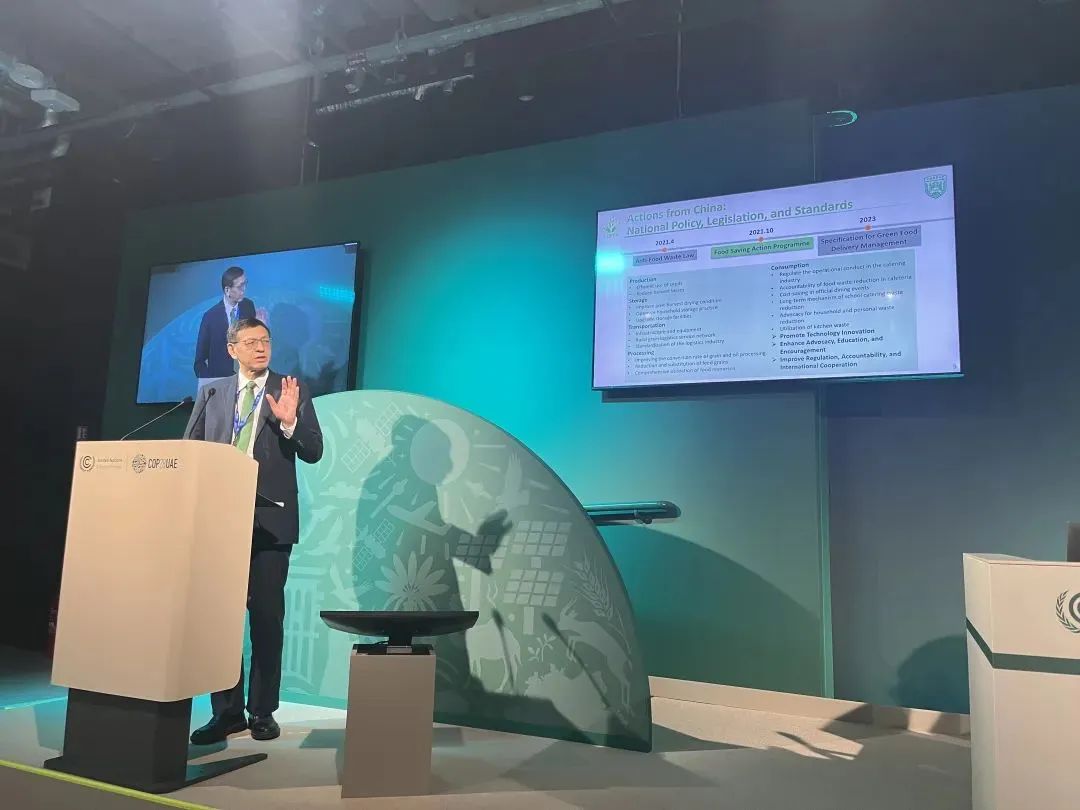
Participated in the new policy report by the Global Panel on Agriculture and Food Systems for Nutrition: "Food Systems and Planetary Goals: Two Inseparable Policy Agendas"
As a member of the Global Panel on Agriculture and Food Systems for Nutrition, Dr. Shenggen Fan participated in the group's new policy report "Food Systems and Planetary Goals: Two Inseparable Policy Agendas."
The report pointed out that without achieving climate change and environmental goals, there is no viable future for the food system. Conversely, these agendas cannot be realized without transforming the current unsustainable food system. The report urged countries to establish concrete, measurable, and transparent plans to transform food systems and take action.

Participated in World Economic Forum 14th Annual Meeting of the New Champions
The 14th Annual Meeting of the New Champions (2023 Summer Davos) was held at the Tianjin Meijiang Convention and Exhibition Center from June 27th to 29th. Dr. Shenggen Fan participated as a public speaker in the session of soil matters. In the preheating phase of the meeting, Dr. Shenggen Fan interpreted the future trends of China's agrifood systems transformation on the World Economic Forum website, proposing seven major trends of food systems transformation:
Address nutrition challenges
Promote sustainable food production
Guide consumption changes
Promote agricultural research and development investment
Redefine the priority order of public policies
Mobilize the private sector
Explore alternative proteins using a systematic approach

Undergraduate Micro-Minor at CAU: Agricultural Carbon Neutrality Management
Based on the foundation of the national first-class program "Agricultural Economics and Management" within the College of Economics and Management (CEM) at CAU, AGFEP initiated a micro-minor "Agricultural Carbon Neutrality Management." The program integrates the efforts of both CEM and the College of Resources and Environmental Sciences for innovative teaching. It aims to cultivate talents capable of interdisciplinary research and international cooperation for exploring and analyzing emerging topics on carbon neutrality and agrifood systems transformation. Core courses are oriented on carbon accounting, carbon footprint estimation, carbon trading theory and practice, and other relevant topics. Students are expected to have a strong social responsibility and the needed capabilities to contribute to China's and global sustainable development agendas.
Dr. Shenggen Fan and Dr. Xiangming Fang are named the Elsevier 2022 Most Cited Chinese Researchers
On March 28, the global information analysis company Elsevier officially released the 2022 "Most Cited Chinese Researchers" list, in which Dean Shenggen Fan and Professor Xiangming Fang were named. The list uses the Scopus citation and indexing database as the source of statistics to identify Chinese scholars at different stages of their research careers from multiple dimensions and systematically showcase their research performance. Dr. Shenggen Fan and Dr. Xiangming Fang were listed in the disciplines of "agricultural and forestry economics and management" and "applied economics," respectively.


In 2023, AGFEP members published 75 peer-reviewed papers, including 37 articles in SCIE/SSCI journals and 24 articles in CSCD/CSSCI/PKU journals. These papers covered various topics, including the "Big Food" concept, sustainable healthy diets, food security, food consumption behavior, trade, and genoeconomics.
Special issues in FASE and Agribusiness officially published
In April, the "Food Systems Transformation" special issue organized by Professor Shenggen Fan and Associate Professor Ting Meng was published in Frontiers of Agricultural Science and Engineering (FASE).
This special issue focuses on the transformation of food systems to achieve the goals of food security and environmental sustainability. It comprises 10 articles, including reviews and research from authors worldwide. It elaborates on four main themes related to food and agriculture, including a systemic perspective, enhancing sustainable production, guiding consumer behavior, and optimizing financial support. It provides readers with a comprehensive understanding of the research progress in food system transformation.
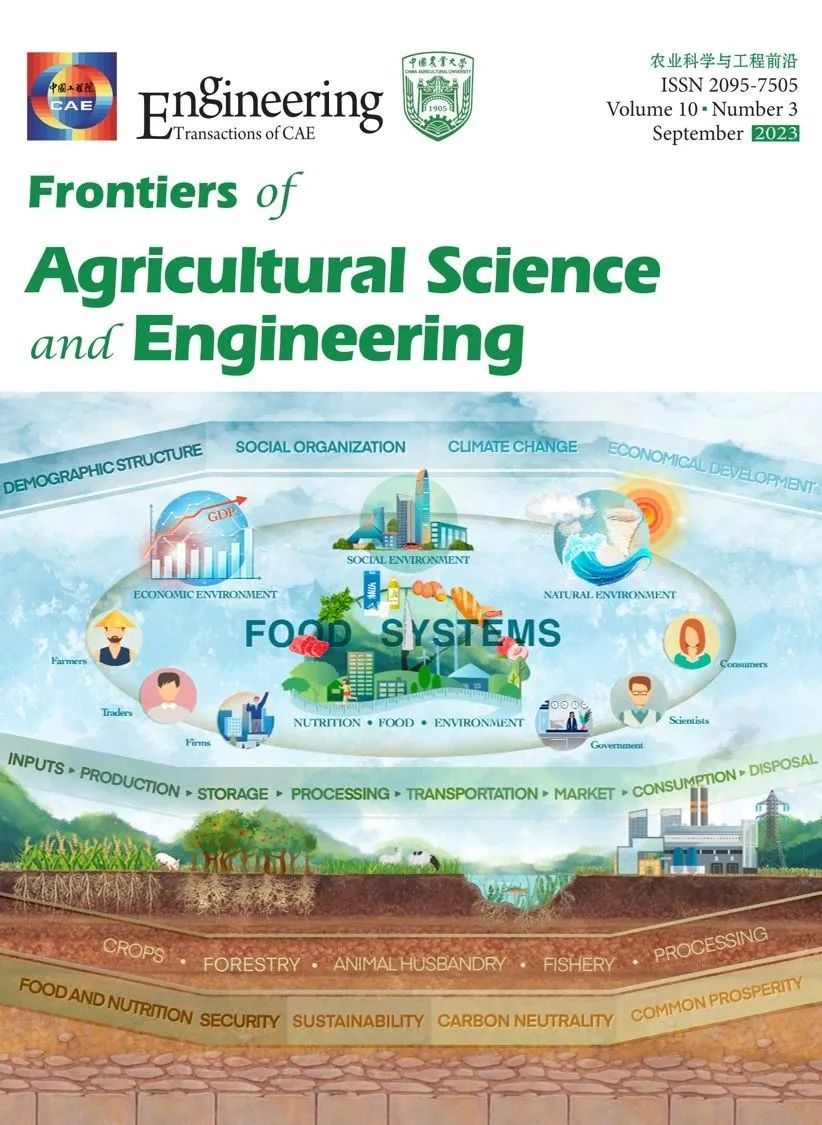
In December, the "Transforming Food Systems for Improving Nutrition and Health in Emerging Economies" special issue organized by Professor Shenggen Fan and Professor Chen Zhu was published in Agribusiness. Agribusiness is indexed in both SCI and SSCI. AGFEP members Wei Si, Xiangming Fang, Xu Tian, Qiran Zhao, and Jingjing Wang have contributed articles to this special issue.
This special issue aims to comprehensively analyze the impact of agrifood systems transformation on residents' food consumption,nutrition, and health. It focuses on policies related to pensions, agricultural subsidies, nutrition improvement programs, and carbon taxes. It also examines the effects of external environment improvements, such as the emergence of internet access and e-commerce. This special issue is expected to share experiences and lessons with other developing countries undergoing similar agrifood systems transformations for a healthier and more sustainable future.
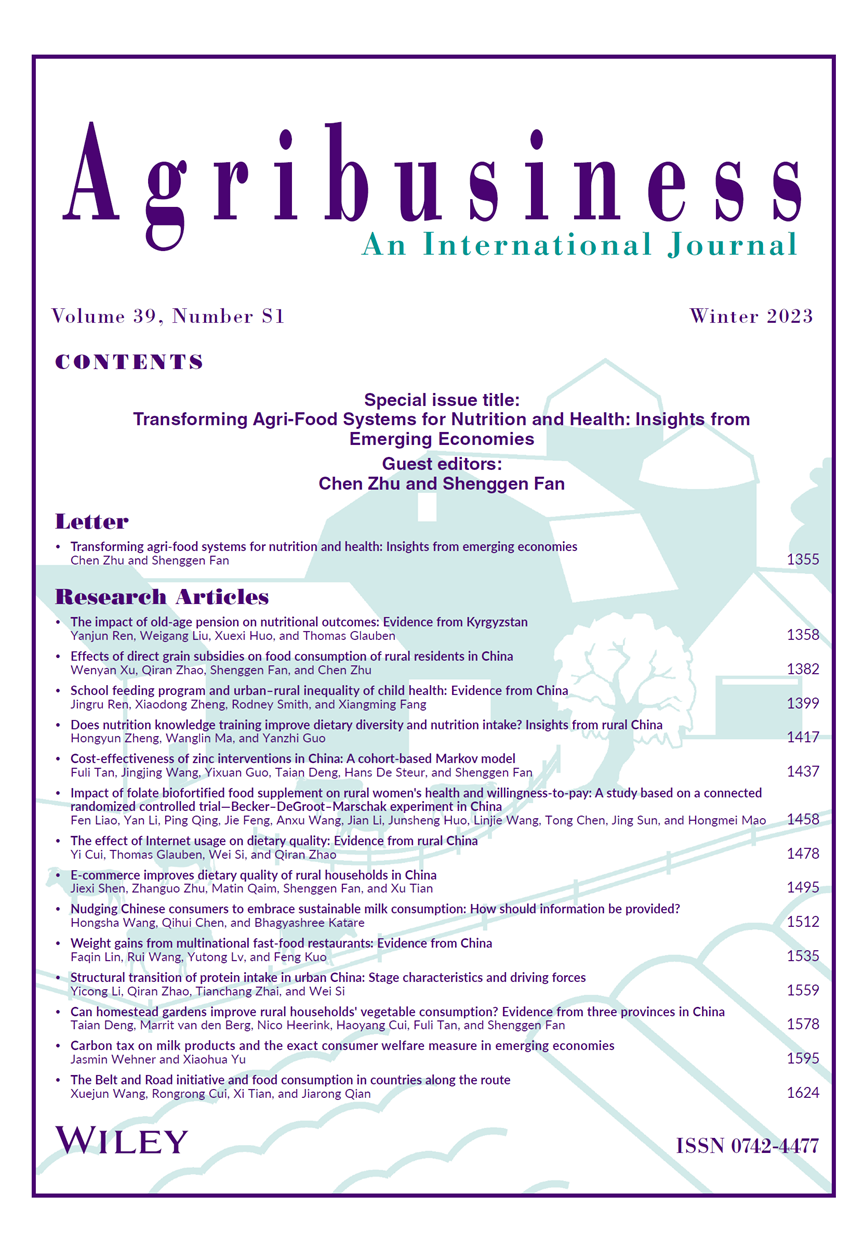
Selected Publications
Professor Shenggen Fan, Associate Professor Qiran Zhao (corresponding author), doctoral student Ying Zhang (first author), and master's student Ruotong Li published "The impact of peer effect on students' consumption of sugar-sweetened beverages—instrumental variable evidence from north China" in Food Policy.
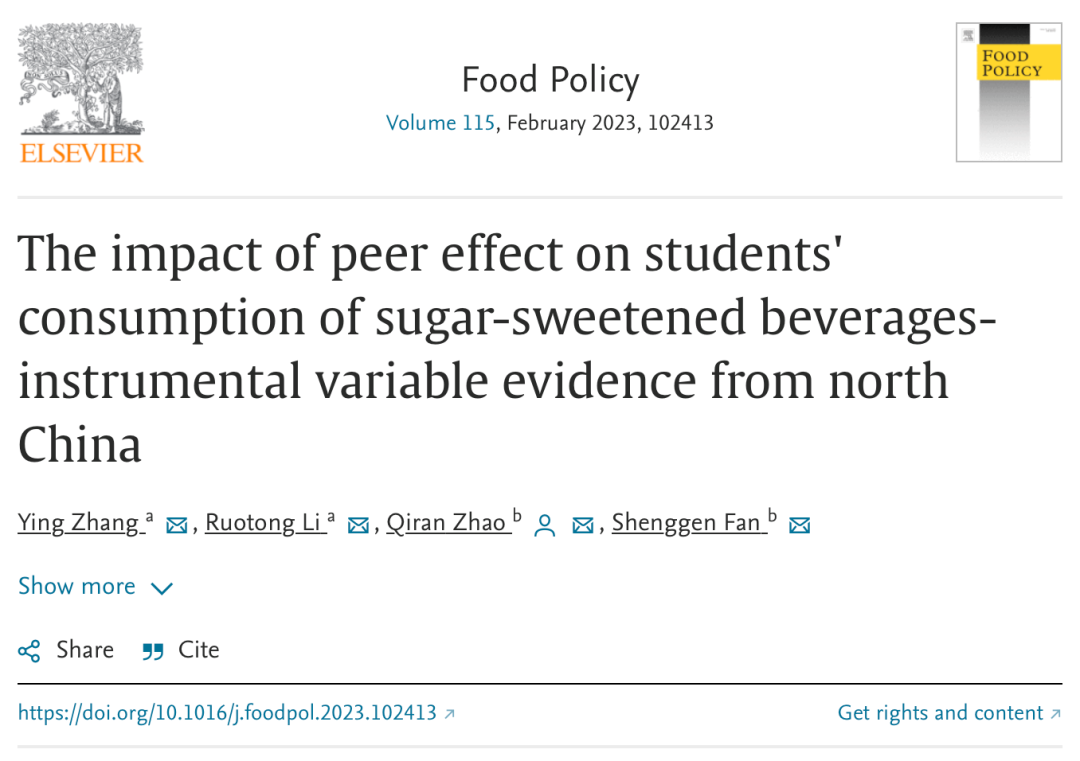
The paper "Toward healthy and sustainable diets for the 21st century: Importance of sociocultural and economic considerations", written by Professor Shenggen Fan and researchers from Wageningen University and Research, Johns Hopkins University, Montpellier University, and other institutions, published in Proceedings of the National Academy of Sciences(PNAS). The article discusses the prospects and future directions of achieving healthy and sustainable diets based on different sociocultural and geographic subsystems of food systems. It emphasizes the importance of broader sociocultural and economic drivers influencing food choices, food environments, health, and environments. It also discusses the additional value of food system approaches and the responsibilities of food system participants.
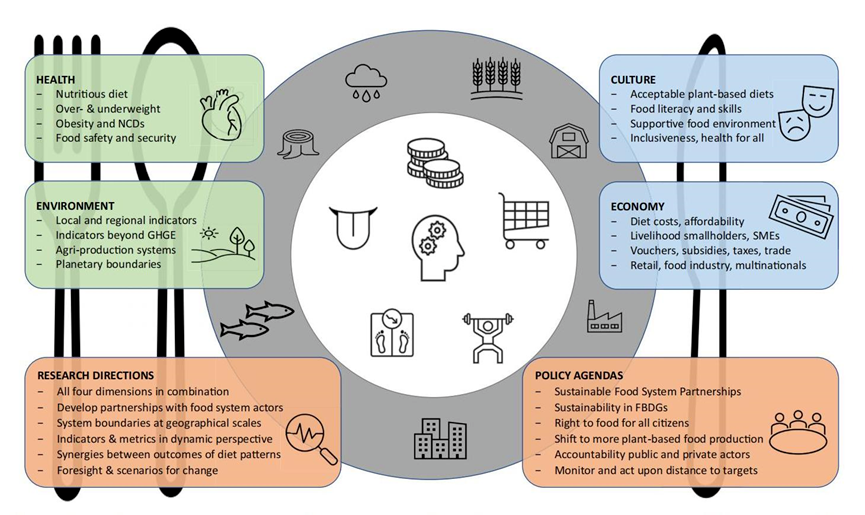
Professor Shenggen Fan collaborated with researchers from Western Sydney University, University of Guelph, Georgetown University, the European Commission, and other institutions and organizations to publish the paper "Food systems transformation requires science–policy–society interfaces that integrate existing global networks and new knowledge hubs" in Nature Food. The article explores how to shape more effective Science-Policy-Society Interfaces (SPSIs) given the urgent need for food systems transformation. It emphasizes that global decision-makers must collaborate closely and create SPSIs with more resources to support the imminent transformation of the food system.
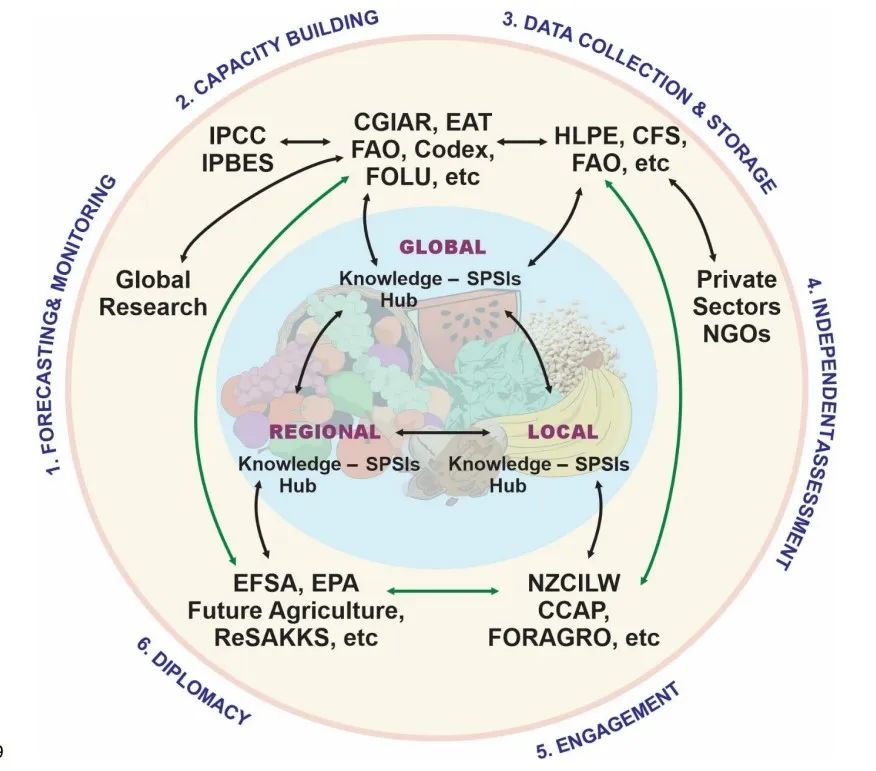
Professor Xiangming Fang published the paper "School Feeding and Children's Noncognitive Skills: Evidence from the Nutrition Improvement Program in Rural China" in Applied Economics with Associate Professor Xiaodong Zheng at Zhejiang Gongshang University and doctoral student Jingru Ren and Dian Chen at CAU.
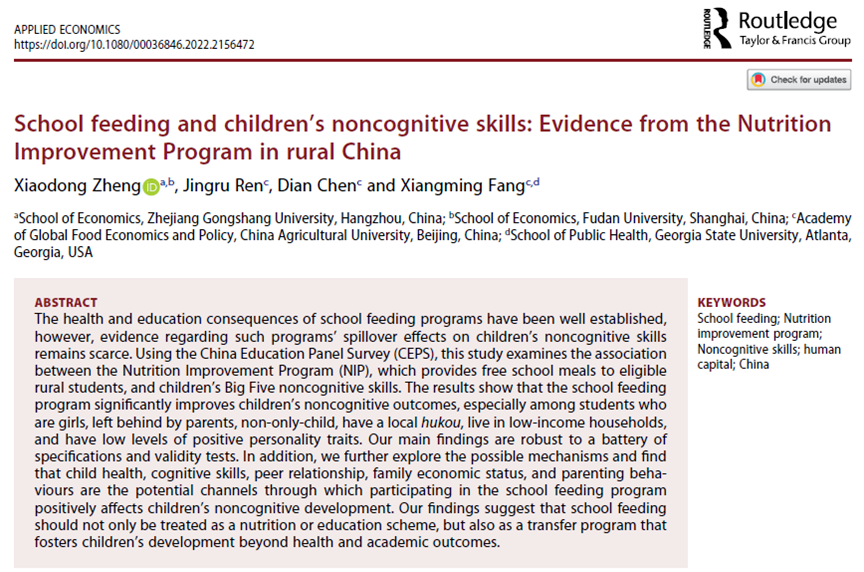
Professors Shenggen Fan and Yumei Zhang published the paper "Strategic Choices for Implementing the 'Big Food' Concept to Promote Nutrition and Sustainable Development" in Issues in Agricultural Economy. The article analyzes the background and scientific connotations of the "Big Food" concept based on the current challenges facing food supply and demand in China. It explores the strategic choices and pathways of reshaping the food supply and demand pattern and agricultural support policies through the "Big Food" approach.
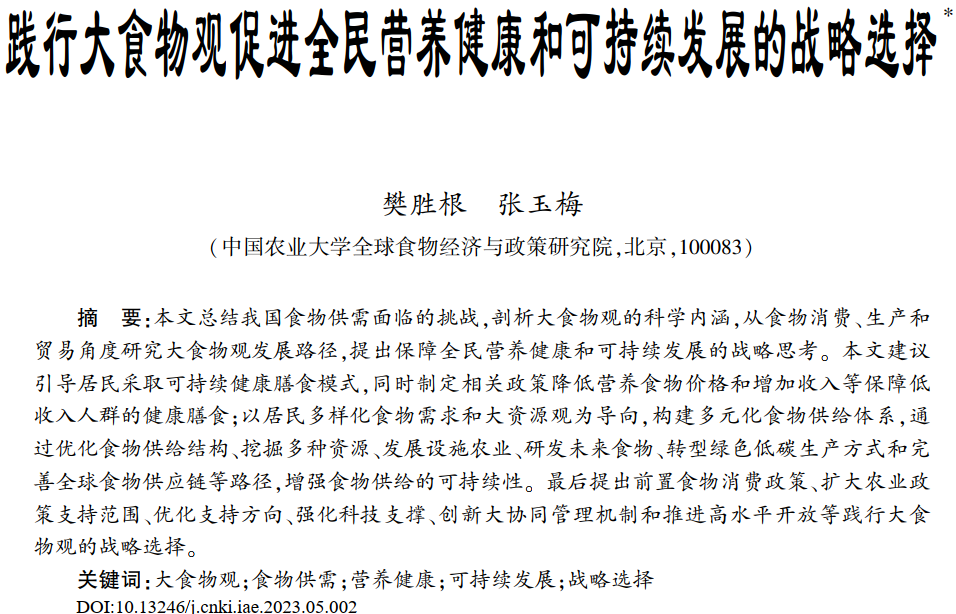
Professor Xu Tian, Assistant Professor Zijun Luo from the University of Nebraska at Omaha, and doctoral student Ying Zhou from Nanjing Agricultural University published "The Impact of Animal Disease Outbreaks on China's Meat Imports" in Emerging Markets Finance and Trade. The article explores the resilience of China's meat imports in response to animal disease outbreaks in the exporting countries. It provides insights into how China's meat imports can help narrow the gap between meat supply and demand in China, reduce China's dependence on feed grain trade, and alleviate the environmental pressures brought about by the rapid expansion of the livestock industry.
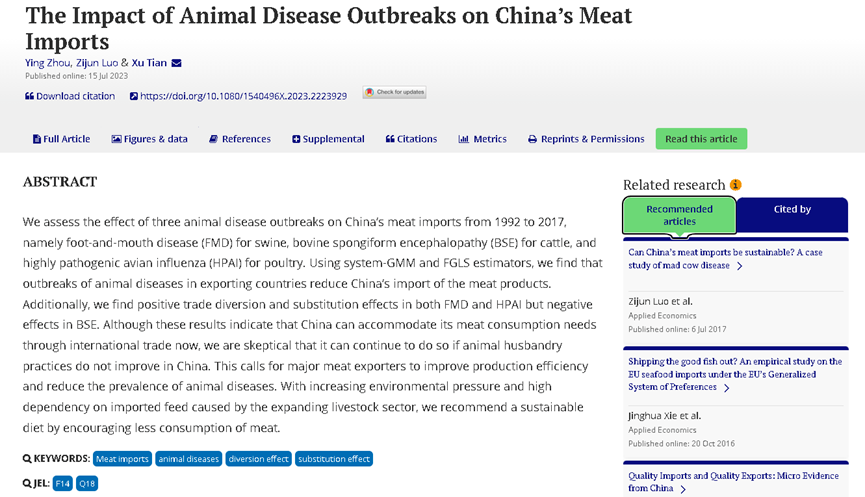

In 2023, 27 new programs were launched, including 8 government-sponsored programs and 19 horizontal cooperation projects.
Multiple AGFEP members received grants from the National Natural Science Foundation of China (NSFC), the National Social Science Fund of China (NSSFC), and Beijing Social Science Fund.
Two postdoctoral researchers have been selected for the 2023 National Funded Postdoctoral Research Program, focusing on "Reconstructing the spatiotemporal process of cadmium in rice from the field to the table and researching the governance path for the whole chain" and "Research on policy response heterogeneity of fertilizer application behavior of grain growers: Identification and analysis based on machine learning algorithms".
In 2023, AGFEP continued its research work for two NSSFC Major Programs: "Food Systems Transformation under the New Context in China" and "The Policy and Mechanism of Promoting Food Security in China through South-South Cooperation". Additionally, AGFEP continues its collaboration with the International Food Policy Research Institute (IFPRI) and the University of Göttingen to implement two NSFC International (Regional) Cooperation and Exchange Programs: "Optimizing China's Agricultural Subsidies to Transform Agro-food Systems under the Global Context" and "The Policy and Mechanism of Promoting China and Global Food Security through South-South Cooperation". The preliminary research outcomes have been disseminated through research reports, academic journals, and international academic conferences, promoting discussions in relevant global fields.
At the same time, AGFEP has conducted research projects in collaboration with many domestic and foreign partners around topics such as South-South cooperation, food systems index, reducing food loss and waste, and emissions reduction. Our work aims to contribute to the international agenda of food systems transformation and the pace towards sustainable development goals.
Notable Research Programs
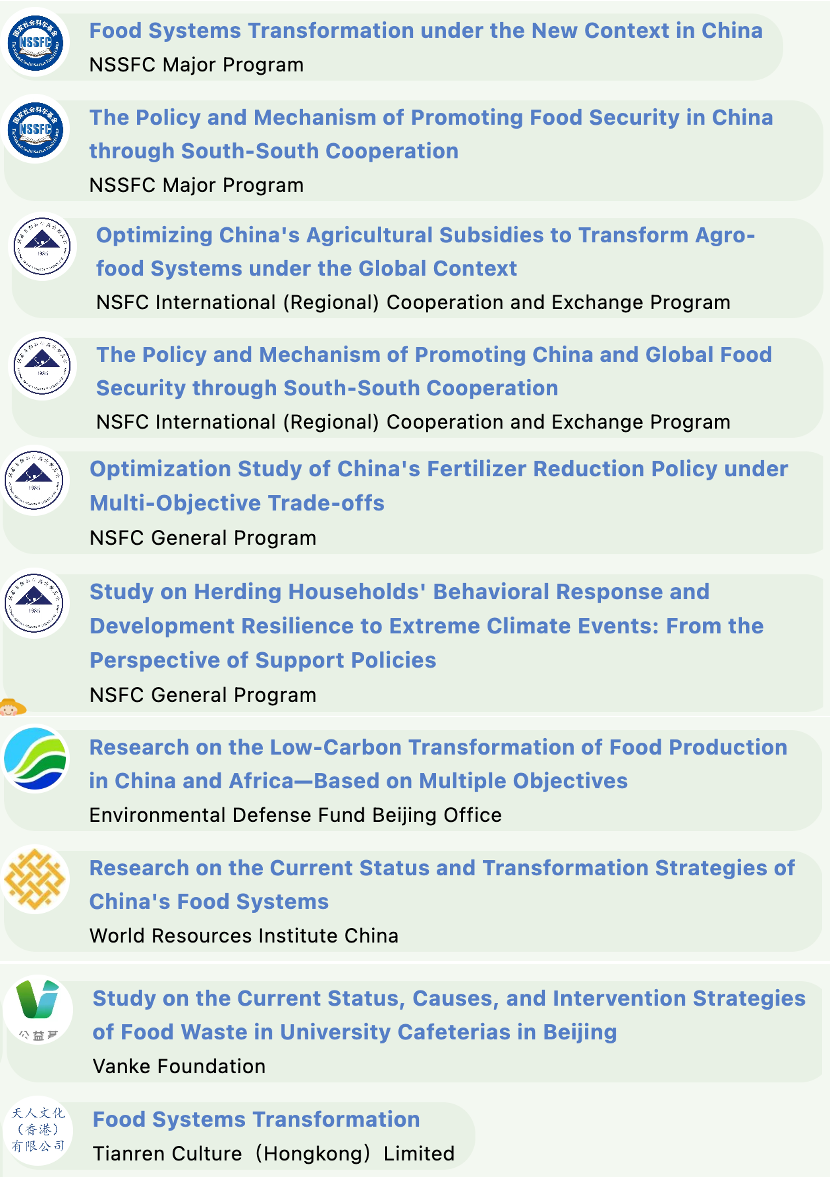

In 2023, AGFEP members led teams to conduct large-scale surveys in Hebei, Shanxi, and Hubei provinces. Nearly 1,800 rural samples were collected, and tracking surveys were conducted in Hebei and Hubei, covering more than 500 households. This year's research focused on the 24-hour dietary recall of rural residents, agricultural production, and other relevant information. Particularly in Hebei and Shanxi, the survey paid attention to producing and consuming indigenous grains.
AGFEP conducted research and academic exchanges in Nei Mongol Zizhiqu, focusing on intelligent husbandry, forage technology innovation, and germplasm resource conservation. In Shanxi province, the team investigated the status of indigenous grains and beans, providing strategic recommendations and policy references for the high-quality development of the indigenous grain industry in the province. A seminar on the development of the indigenous grain industry and rural revitalization in Shanxi was held to explore the prospects and pathways for rural revitalization. In Yunnan province, a pre-survey of rural households was conducted, collecting household baseline data regarding living status, agricultural production, food consumption, rural revitalization, and common prosperity. It laid the foundation for subsequent large-scale surveys.

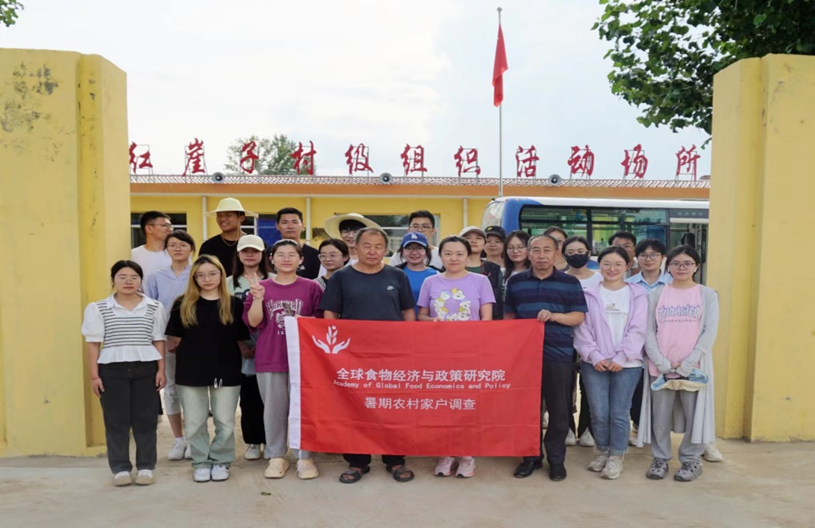


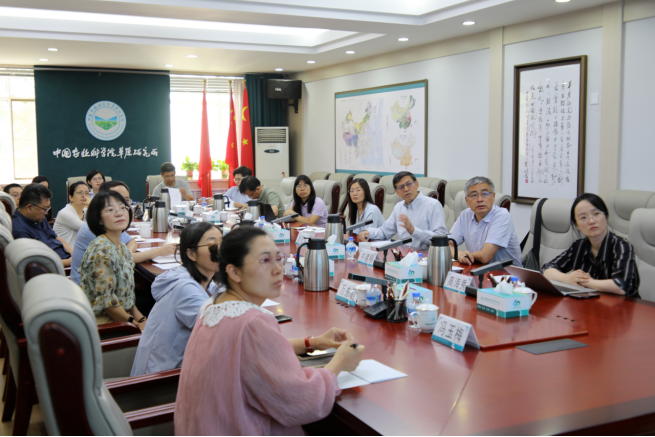
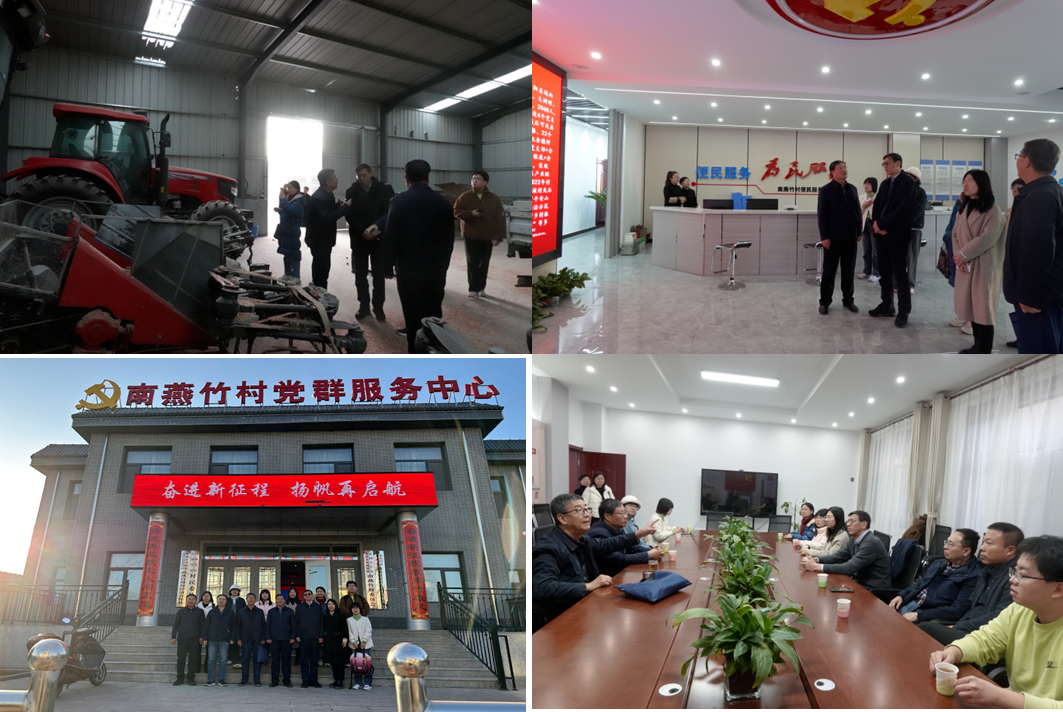
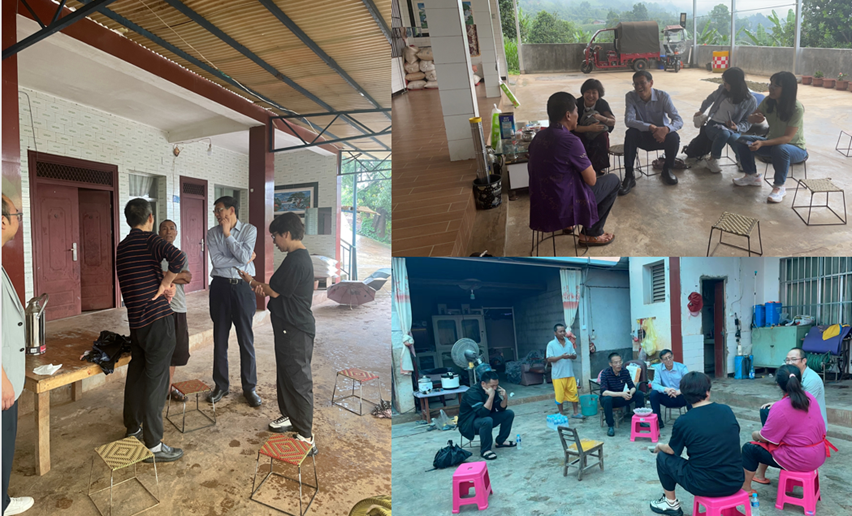

Transforming Agrofood Systems: The Role of Science
By Dr. Arthur P.J. Mol, the President of Wageningen University & Research
Domestic Industrial Relocations in China: Why and How?
By Dr. Xiaobo Zhang, Chair Professor and the Director General of the Center for Enterprise Research at Peking University
Towards a Greener World Agriculture: Repurposing Policy Support
By Dr. Arie Kuyvenhoven, Professor Emeritus at Wageningen University & Research
Rural Transformation and Why It Matters - Experiences of China, Indonesia, Pakistan and Bangladesh
By Dr. Christopher Findlay, former Executive Dean of the Faculty of the Professions at the University of Adelaide
Several Issues and Research Progress in Environmental Economics: Starting from Bitcoin Mining and Risk Management
By Dr. Shouyang Wang, Director General of the Research Center for Predictive Science at Chinese Academy of Sciences
Decarbonization scenarios and carbon reduction potential for China's road transportation by 2060
By Dr. Quanying Lu, Professor at Beijing University of Technology
Education and Income Inequality: The Impact of Higher Education Expansion
By Dr. Guanghua Wan, Director General of the Institute of World Economy at Fudan University
Satellite Technologies, Innovative and Smart Financing for Food Security
By Dr. Liangzhi You, Senior Research Fellow at International Food Policy Research Institute (IFPRI)
Combining Agricultural Diversification and Technology for a Global Food Systems Transformation
By Dr. Thomas C. Wange, Associate Professor and the Principal Investigator of the "Sustainable Agricultural Systems & Engineering" laboratory at Westlake University

In 2024, AGFEP will continue to conduct research, expand capacity-strengthening activities for both Chinese and international students, convene seminars, workshops, and conferences, and serve as a knowledge platform to support food systems transformation in China and globally. Major topics in the team's 2024 research plan are as follows: food supply diversification, transforming food systems for agriculture development, sustainable food systems, and gender issues in food systems. The team will continue its long-term work on food security, sustainable and healthy diets, resilient food systems, and common prosperity.
AGFEP's annual flagship report, "China and Global Food Policy Report," will be launched in spring 2024. The major theme will be on diversified food supply. For detailed information, please visit our website (/) for the release event and the full report in 2024.
The team will endeavor to develop its international cooperation network. Leveraging the International Forum of Low-Emission Agrifood Systems (IFLEAS) and the China-Africa Food Policy Network, the team looks forward to achieving more research outcomes and impacts on carbon neutrality and South-South cooperation.
AGFEP will establish model centers and data platforms for academic cooperation. Through actively engaging in collaborative research projects, the team will strive to fully harness the capability of its food systems models and database, such as the CAU-AFS model and the rural household datebase.
In 2024, AGFEP will continue to co-organize the World Agrifood Innovation Conference (WAFI) in Beijing. With the vision of "Innovating Agrifood Sharing Future," WAFI is devoted to promoting international exchange and cooperation for transforming global agrifood systems.

